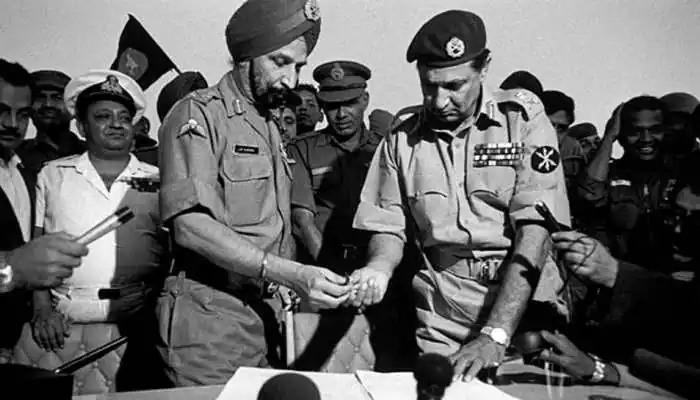
R Krishna Das
The Indian Air Force (IAF) planes were hovering over Dhaka on December 16, 1971, much to the surprise of Pakistani soldiers and supporters.
In glaring contrast to previous routines, not a single shot was fired on it from the ground. It was the most bizarre scene.
The first few sorties were made at considerable altitude but soon the planes started to fly lower and lower until people could clearly see the pilots. Suddenly, large numbers of pamphlets were thrown from the planes.
Printed in English, Bengali and Urdu, it was an invitation to the public to rush to the Ramna Race Course ground in the afternoon to witness the surrender of the Pakistan Army, which had unleashed a realm of terror; killing innocent Bengalis and inflicting atrocities on millions of women over the months.
The Government of India led by Indira Gandhi advised Pakistan to stop atrocities on innocent civilians and create a situation for the return of the refugees who crossed over to the Indian side. Pakistan did not respond; forcing India to launch a full-scale war. Following the International pressure, a ceasefire was reached. The Pakistani officials, soldiers were asked to surrender.
Had it not been so, on December 17, 1971, officials and soldiers of the Pakistani Army would have been massacred by the Mukti Bahini (Liberation Army) fighters. The Pakistani Army must be thankful to the Indian Army for “saving” over 93,000 soldiers as the furious fighters were in no mood to spare them given the inhuman atrocities they had inflicted on Bengalis.
The Indian Army had in fact cautioned Pakistani commanders well before. When the paper works were on after the cease fire for surrender, Lieutenant General AAK Niazi rejected the document carried by Mayor General (later Lieutenant General) JFR Jacob at first glance that called for an unconditional yet honorable surrender. He insisted upon discussing only a ceasefire. Niazi’s advisors, Maj Gen Jamshed, Rear Admiral Sharif, Air Commodore Imam and Air Commodore Farman Ali suggested to him to not agree to the surrender.
Major General Jacob briefed him that the surrender ensured dignity of officers and men as per Geneva convention and later safe return to West Pakistan. He clearly hinted at the possibility of a violent reaction by the Mukti Bahini and people of Bangladesh against the Pakistani soldiers in the absence of protection by the Indian forces. Major General Jacob said in case the terms were not agreed to, the offensive would resume immediately and Mukti Bahini fighters were ready to be unleashed. He gave Niazi thirty minutes to decide and walked out of his office.
Niazi later realised he did not make a mistake.
In the afternoon of December 16, intrigued and hopeful Bengalis flocked to the race course. Millions of Bengalis gathered raised thunderous slogans of ‘Joy Bangla’ and ‘Jai Hind’ as Niazi signed the Instrument of Surrender and handed over his pistol to Lt Gen Jagjit Singh Aurora. East Pakistan died and Bangladesh was born.
At the end of the ceremony, the crowd that spilled out from the race course was on an ecstatic high. The euphoria of freedom made the crowd boisterous. The cries of ‘Joy Bangla’ were now changed to ‘Kill the Pakistanis’.
As the dark fell, colonies housing the West Pakistanis heard loud commotion. What the people saw made them freeze with terror. A large unruly and bloodthirsty Mukti Bahini mob brandishing bamboo sticks and leather whips was coming down the road to the houses. Their faces were distorted with hate and fury. They were in a frenzy, shouting ‘Joy Bangla, kill the Pakistanis, kill the traitors.’ Many perished in the massacres that went on throughout the night. The next day, December 17, Pakistani soldiers were the target.
But no one dared to attack the Pakistani troops; they were in the safe custody of the Indian Army.
Dhaka was put under control of Lt General Sagat Singh. General Niazi was shifted to Calcutta while remaining Pakistani troops were sent to safe prisoner-of-war (POW) camps.



